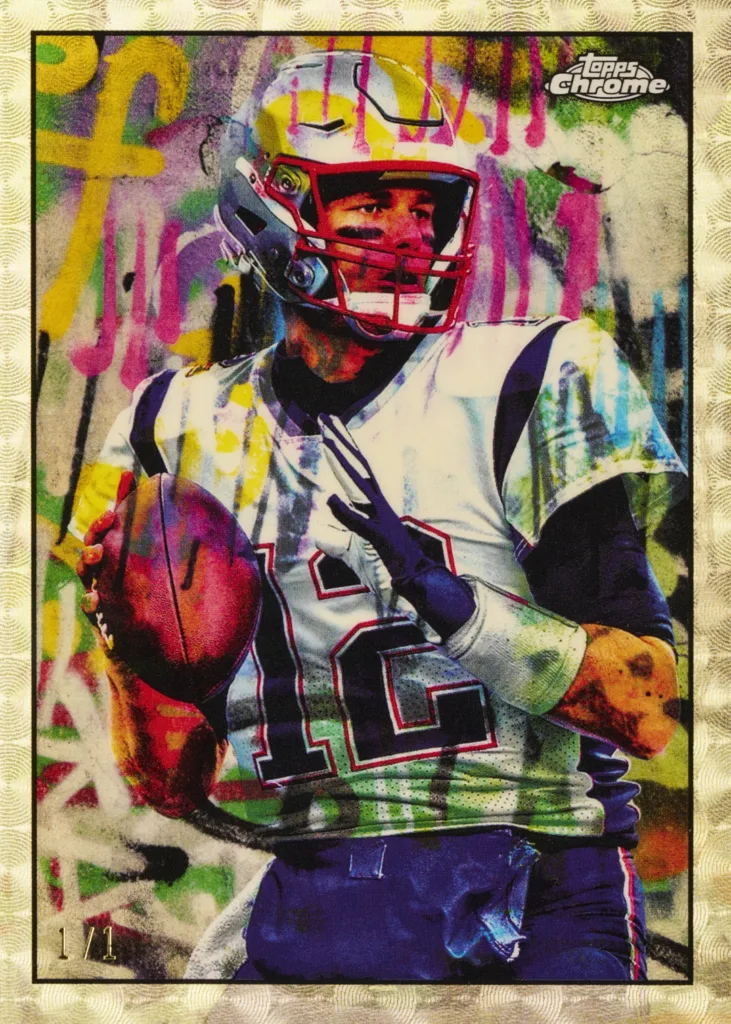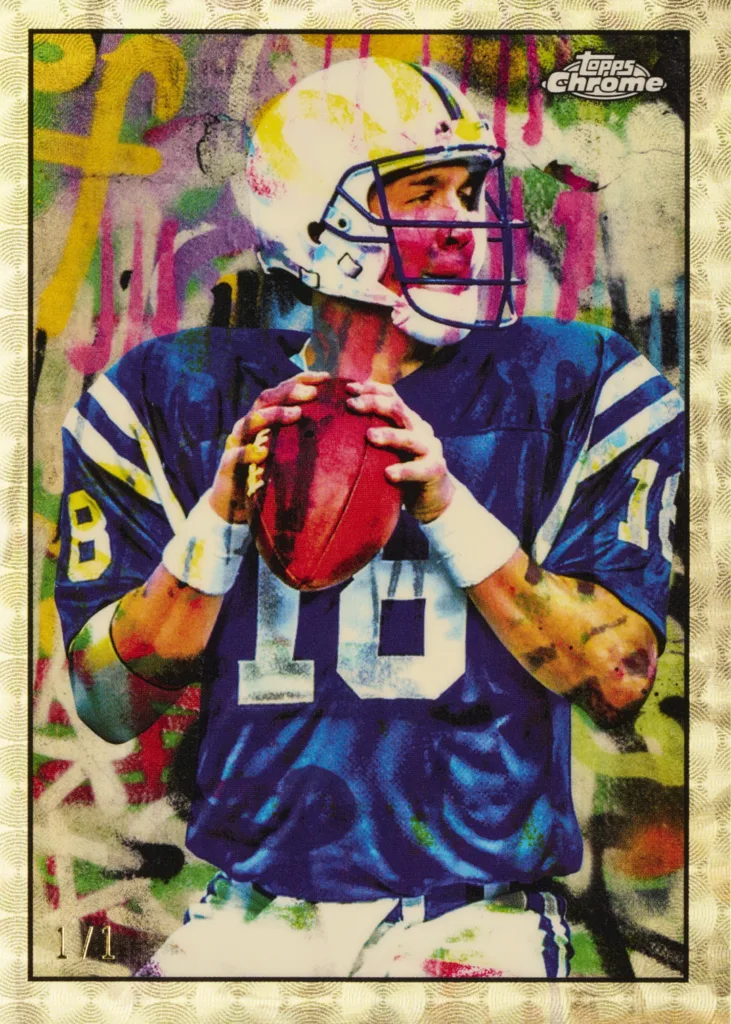
The QB Battle That Defined An Era


If you’re telling the story of the NFL in the early 21st century, you start with Tom Brady and Peyton Manning. One or both of these generational quarterbacks appeared in the AFC title game in eleven of fifteen years between their first meeting and Manning’s retirement. Four times, they faced each other for a chance to go to the Super Bowl. Their almost-annual regular season meetings were appointment viewing and checkposts on the journey of legacy-making.
At first, it was about underdog Brady, of sixth-round draft pick lore, taking his shot at Manning, the NFL’s prodigal son. But eventually, these two were dragging the entire league into an unprecedented era of quarterback primacy and longevity. This had become a battle for GOAT status, a rivalry which, alongside Magic-Bird, Federer-Nadal, and Ali-Frazier, remains one of the best in modern sports history.


2001: The Beginning of the Odyssey
This was never meant to be a rivalry. When they first met, Manning had already established himself, not just as a top overall draft pick, but as a star. Manning was MVP runner-up in only his second season in the league. 2-0 to start the next year, the Colts were facing an 0-2 Patriots team whose season already felt lost following a defeat to the Jets, which saw Drew Bledsoe hospitalized after a hit from Mo Lewis. Brady would be making his first start as nothing more than a placeholder for Bledsoe, the Patriots’ own former top overall draft pick. In 2009, Brady said, “My first start came against the Colts. And Peyton came over on our field and said, ‘Hey, I’m Peyton Manning.’ And I said, ‘No s***.'”
But a funny thing happened on the way back to obscurity. Brady led the Patriots to a shocking 44-13 win. Only three weeks later, Brady put on a game-management clinic, going 16/20 for 202 yards, three touchdowns, and zero turnovers to beat Manning again. Brady went on to win his first Super Bowl. This was the final season the Colts and Patriots shared a division. But realignment would do little to keep Brady out of Manning’s way.


2003 & 2004: Brady Builds Legend at Manning’s Expense
The early rivalry wasn’t really that much of one. Despite the gap in pedigree, a common theme emerged in these years. Manning put up historically great numbers and began to pile up MVP trophies. He passed for over 1,500 more yards and 27 more touchdowns than Brady in this span. But Brady was busy becoming a legend: his virtuosic game management and a knack for the clutch combined to create a monster. Two years in a row, Brady (with the help of a Coach Belichick at the peak of his powers) dominated Manning in the playoffs on the way to building the first Patriots dynasty. The four-interception game from Manning in the 2003 AFC Championship was perhaps the worst of his career.
Still, the 20-3 loss in ’04 felt even more dispiriting. A perfect encapsulation of the rivalry at the time, as sleet and snow poured down on a chaotic Gillette Stadium, Brady was better prepared, more ready for the moment. Manning was coming off a then-record 49 passing touchdowns and second MVP, yet still, Brady and Bill had his number. He went for a mere 238 yards passing and zero scores in the embarrassing defeat. All told, Brady won the first six encounters. Whispers were getting louder: was this Marino and Montana redux? Never mind winning the big one. Against Brady, could Manning win any game?


2005 & 2006: Manning Gets Revenge
After six straight losses, Manning finally broke through, beating Brady at New England 40-21. However, it did little to quell the feeling that Manning was still second fiddle. The Patriots were going through an injury-filled campaign on the heels of losing both coordinators following the 2004 Super Bowl win.
Manning left no doubt in 2006. The two juggernauts were a combined 13-1 before Manning beat the Pats again in Foxborough. A playoff rematch left Manning one game away from the Super Bowl, with his nemesis, finally, having to come to Manning’s turf.
In the greatest playoff game of the rivalry, the script looked set to repeat itself. Even indoors in Indy, Manning looked cooked after a second quarter pick-six helped give New England a 21-3 lead. But, darkest before dawn, and all that.
The second half was one of the best in postseason history, as the two superstars went back and forth. Colts Offensive lineman Dan Klecko caught a Manning touchdown. A controversial Jabar Gaffney score in the back of the end zone gave the Pats back the lead. Colts Offensive lineman Jeff Saturday recovered a fumble and scored his own touchdown. A late Brady drive led to a field goal to go up three before Manning was stopped with less than four minutes to go. It was over.
Until it wasn’t. A huge stop by the Colts gave them one last shot. This time, it was Manning pulling a Brady on Brady, capping the comeback with a masterful drive (and a touch of luck after Reggie Wayne nearly fumbled the game away). The monkey was off Manning’s back, even if he didn’t care to admit it. “I don’t get into monkeys and vindication,” Manning said. “I don’t play that card.” Two weeks later, he was a Super Bowl champion.


2007: The Biggest Regular Season Game of All-Time
This one was a prize fight. Two undefeated heavyweights, a combined 15-0. The Patriots were halfway through an undefeated season in which they were looking like the best team in NFL history. If they were going to slip up, on the road to the 7-0 Colts seemed like the place. The Pats, who had averaged over 41 points per game heading into the matchup, trailed 20-10 in the fourth. However, Brady launched a signature deep ball to Randy Moss to set up a quick score before going ahead on another touchdown pass. Manning fumbled the ball on his final drive, giving the Patriots one of the most important regular season wins in franchise history. New England had overcome its biggest hurdle on the way to the first undefeated regular season since 1972. Peyton had his brother Eli to thank for helping prevent Brady from winning yet another ring.
Brady and Manning would split meetings in 2009 and 2010, the last matchups in the rivalry from Manning’s time with the Colts. The two stars would go seven seasons without a championship, but they had transformed from nascent stars to living legends rewriting the record books. When Manning left Indianapolis for Denver, few would have guessed that Brady/Manning would become that rarest of an American story—one with a second act.